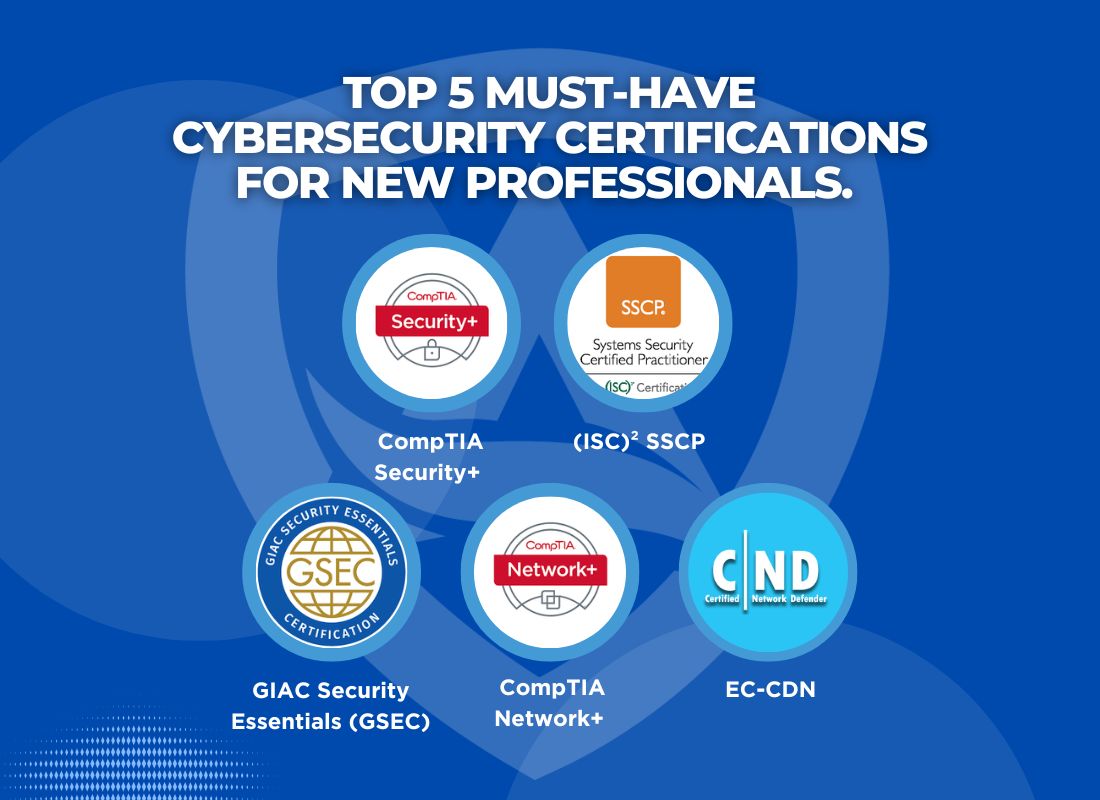It is no secret that there are a vast array of certifications available in the cybersecurity industry. From CompTIA to CISSP, to CISA, how would you know which ones are worth getting?
Having the right certifications is an essential aspect of the cybersecurity industry. While there are hundreds of available certifications from a wide range of organizations, not all certs are created equally. Before you spend your valuable time and money studying for these, it is important to understand which certifications are right for you and your cybersecurity career and salary goals. You’ll also want to know what topics they focus on, how to get them, and the investment you must make.
If you are new to the field or a recent college graduate, cyber certifications are a valuable validation of your knowledge, skills, and experience in specific techniques, concepts, and tools of cybersecurity. They demonstrate more specific ability and competence than a cybersecurity degree might. For those of you early on in your cybersecurity career, We’ve picked out the top 5 most valuable certifications to stand out on the cybersecurity jobs market.
CompTIA Security+
The CompTIA Security+ certification is a foundational stepping stone for those entering the cybersecurity field. It validates a broad range of essential cybersecurity skills, including risk management, cryptography, and network security. To earn this certification, candidates must pass the SY0-601 exam, which consists of a maximum of 90 questions and lasts 90 minutes. The exam costs $370, and while there are no strict prerequisites, CompTIA recommends having at least two years of work experience in IT. CompTIA does a great job of providing various training resources, such as study guides and online courses, on their website. For more details, visit the CompTIA Security+ page.
- Prerequisites: None | 2 years experience (recommended)
- Cost: $370
- Estimated Study Time: 1-2 Months
(ISC)² SSCP
The (ISC)² SSCP (Systems Security Certified Practitioner) certification is designed for IT professionals aiming to prove their skills in implementing and administering IT infrastructure with cybersecurity best practices. The certification covers seven domains: Security Operations, Access Controls, Risk Identification and Monitoring, Incident Response, Cryptography, Network and Communication Security, and Systems and Applications Security. To earn the SSCP, candidates must have at least one year of work experience and pass an exam. The exam costs $249. There are various training options available from different providers to prepare for the exam. For more information, visit the (ISC)² SSCP page.
- Prerequisites: 1 year experience
- Cost: $249
- Estimated Study Time: 3-6 Months
GIAC Security Essentials (GSEC)
The GIAC Security Essentials (GSEC) certification is designed for professionals in operational IT systems roles with security-related responsibilities. It validates a wide range of knowledge, including defense in depth, access control, and cryptography. The certification requires an exam consisting of 106-180 questions with a time limit of 5 hours. This certification is particularly suitable for new InfoSec professionals, IT engineers, and security administrators. The exam costs $2,499 and has a recommended study time of 6-8 months, so it is the most expensive one on our list and one of the most rigorous. However, that’s what makes it the most valuable for those who decide to pursue it. For more information, visit the GIAC GSEC page.
- Prerequisites: None | Some experience is preferred
- Cost: $2,499
- Estimated Study Time: 6-8 months
CompTIA Network+
The CompTIA Network+ certification is a globally recognized credential ideal for IT professionals looking to specialize in networking. It covers a wide range of essential topics such as network technologies, installation and configuration, media and topologies, management, and security. To earn this certification, candidates must pass the N10-007 exam, which consists of a maximum of 90 questions and has a duration of 90 minutes. The exam costs $338. There are no strict prerequisites, but CompTIA recommends some hands-on experience or coursework in networking. They provide some training resources themselves, and more can be found online. Network+ is not strictly a security certification, but it covers foundational knowledge in networking principles that are essential to be effective in many cybersecurity roles, and many cybersecurity employers look for broader IT knowledge and experience. For more details, visit the CompTIA Network+ page.
- Prerequisites: None | 1-2 years of experience recommended
- Cost: $338
- Estimated Prep Time: 3-4 Months
EC-CND
The EC Council’s Certified Network Defender (CND) course is a comprehensive program and certification designed to equip professionals with the skills and knowledge needed to manage and secure a network effectively. The course covers a wide range of topics, including network monitoring, data backup, and intrusion detection, and provides a hands-on, practical approach to network security, making it ideal for those who aim to be actively involved in network administration and security. The CND certification is globally recognized and is often considered an asset for professionals in the cybersecurity field. More info on their page
- Prerequisites: 2 Years of work experience or completion of EC Network Security Training
- Cost: $100 or included in price of training
- Estimated Prep Time: 1-3 Months
Conclusion
The cybersecurity landscape is vast and ever-changing, and a career in the field requires continuous learning. Making the right certification decisions is an essential step on that path. The certifications we’ve highlighted—CompTIA Security+, (ISC)² SSCP, GIAC Security Essentials, CompTIA Network+, and EC-CDN—offer a balanced mix of foundational knowledge and specialized skills. Whether you’re just starting out or looking to deepen your expertise, these certifications are excellent investments in your professional development. They not only validate your skills but also make you more marketable in a competitive job market. So, take the time to assess your career goals and choose the certification that aligns best with them. Your future self will thank you.

